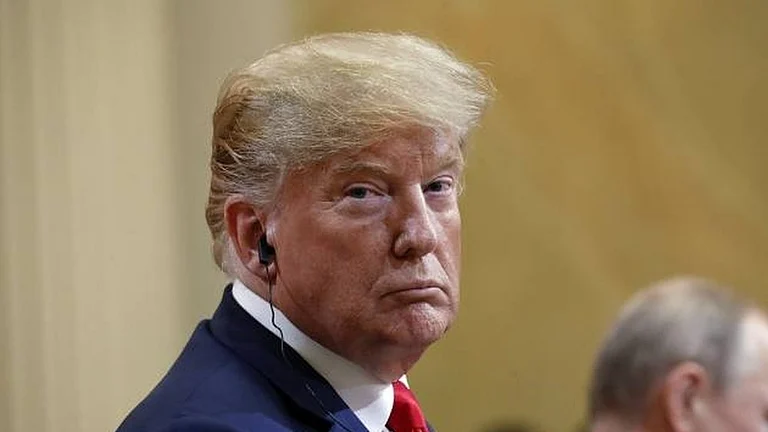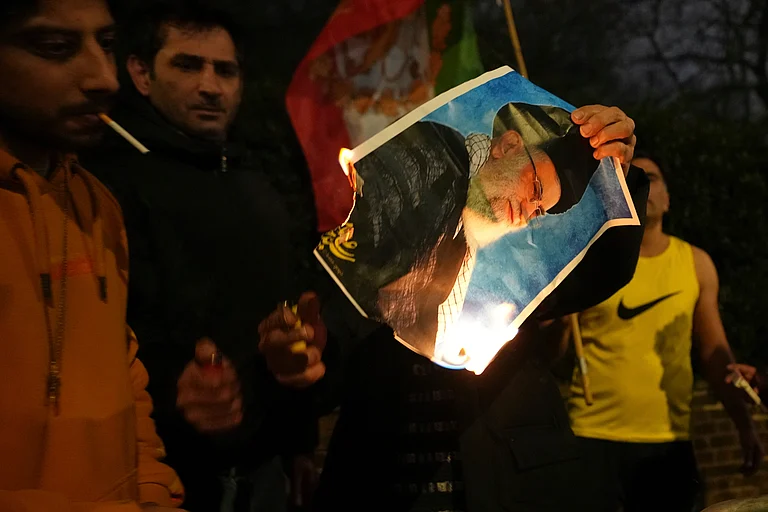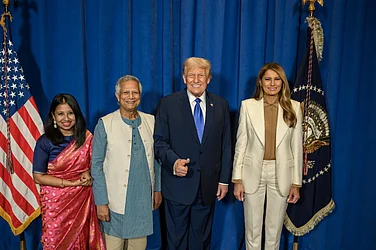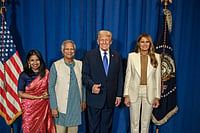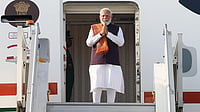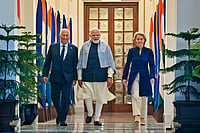Iran’s ambassador to India, Iraj Elahi, is a career diplomat who has served in Dushanbe, Tashkent and several divisions in Iran’s foreign ministry. Before arriving in New Delhi in September 2022, he headed the Eurasia division at the foreign office in Tehran.
Elahi, like most senior Iranian diplomats, is suave, soft spoken and appeared relaxed as he sat down with Outlook for a conversation at a critical juncture for his country. Iran is bracing for an Israeli attack, triggered by its ballistic missile strike on October 1— which was in retaliation for the assassination of top Hamas leader Ismail Haniyeh and not for the killing of Hezbollah leaders, the ambassador insists. There is now a real possibility of an all-out war between Iran and Israel. The success of Israel’s military campaign in eliminating more or less the entire leadership of Hamas and Hezbollah has emboldened Prime Minister Benjamin Netanyahu to take on Iran.
At the moment, Iran is very vulnerable, with the axis of resistance having taken a huge hit. In case a war breaks out, who can Iran depend on? “Iran + Iran + Iran,” says Elahi, adding, “We rely on our people.” He admits it is an “unequal conflict” with Israel and the US ranged against Iran. But Elahi is unfazed: “We have learnt to defend ourselves.”
It is both an acknowledgment of Iran’s strength and its weakness, as self-reliance has perforce become a necessity following the 1979 Iranian Revolution that marked the end of the US-backed Shah dynasty. “We have been under sanctions for more than 40 years. We have tried to make our economy resilient. We have learnt how to by-pass sanctions, we have no problem in earning money,” says Elahi. Many countries continue to buy Iranian oil despite the never-ending sanctions. The ambassador notes: “India was a permanent purchaser of oil from Iran, but now not even a barrel of oil is bought by India. China lifts huge quantities and we are grateful.”
This is not the first time that Iran finds itself alone. It happened during the eight years of war between Iran and Iraq (1980-1988). “The whole world was on one side; we were alone.” All Arab neighbours of Iran had supported Saddam Hussein; so did the US. “Kuwait was sending hot meals for Iraqi soldiers then,” the ambassador recalled. “We are nationalists, we will fight. Remember Vietnam. Who supports us, who does not, is of little relevance to Iran.”
Ambassador Elahi says technology has not been a problem as Iranian scientists, engineers and physicists are excellent. “Iranian scientists are very good. They (Israel) have long tried to hack our system, but could not succeed. Yes, Israel has assassinated several of our nuclear scientists, yet every time one is killed, several others emerge as replacements.” He is also confident that Iran’s nuclear facility deep in the mountains cannot be penetrated by enemy missiles.
But the Iranian system has been penetrated by Israel. After Haniyeh was killed at a Tehran guest house, no less a person than former President Mahmoud Ahmadinejad said that Iran’s intelligence service, tasked with keeping an eye on Mossad, was compromised. The ambassador says, “This is natural; every system, every country has spies.”
The ambassador acknowledged that there has always been a move by interested parties to separate Iran from the Arabs. But the Shia-Sunni rivalry no longer holds. “Iran’s support to Palestine has made Iran popular in the region.” He pointed out that when Haniya, a Sunni, was assassinated in Tehran, Iranian people mourned his “martyrdom” and came out in large numbers to attend his funeral.

Though the envoy did not say as much, it is well known that Arab nations, especially the United Arab Emirates (UAE) and Saudi Arabia, have been playing footsie with Israel much before the Abraham Accords, which led to the UAE and Bahrain normalising ties with Israel, followed by Sudan and Morocco. Saudi Arabia was next in line, but since Israel’s war on Gaza, following the October 7 Hamas attack, the move has been on hold. Though the powerful Crown Prince, Mohammed bin Salman, or MBS as he is commonly called, is keen on maintaining ties with Israel, the support of his people in the bazaars and streets of the Arab world for the Palestinians has made Riyadh push the pause button.
The Two-State Solution Is Buried
The ambassador believes that the two-state solution is now dead and gone. “There is no room now for the Palestinians, they have nowhere to go. The eradication of the Palestinians from their land has long been the dream of the Zionists.”
According to the ambassador, Hamas attacked after it got wind of Israel’s plan to redraw the boundaries of the country and grab Palestinian land for a Greater Israel. While speaking at the UN General Assembly in September 2023, Netanyahu spoke of the new peace initiative brought on by the Abraham Accords to show how Israel wanted to live in peace with its Arab neighbours. He boasted of Israel’s growing relations with the Arab world. But he also held up a map of Israel that placed the West Bank and Gaza as well as Syria’s occupied Golan Heights within the boundaries of the sovereign state. Israel was highlighted in blue.
“Some people believe that the starting point of the current crisis is October 7, but those who are familiar with the history of the region are aware that it goes a long time back―to 1947-48―when Israel was established. And even before that when Jews entered Palestine and grabbed large tracts of land and settled there by force. Remember the Nakba of 1948, the ethnic cleansing of Palestinians by Zionists.
At the same time, there was resistance by the people of Palestine as well as by Lebanon, Egypt and Syria,” Elahi said. He went on to explain the wars that Arab countries fought and their staunch support for the people of Palestine in the early years. “It is up to the leaders to judge what the starting point was; it is not October 7.”
Change The Geopolitics Of The Region
“We should go behind the current development. It is a big plan designed by the US and is being implemented by Israel to change the geopolitics of the region. Israel’s action in Gaza after the Hamas attack was not just to punish terrorists―not just to punish Hamas―but to work on a larger plan,” Elahi said.
He said the plan was in the making for a couple of years and was not whisked out of the blue. “There are different elements in the reshaping of the region. The first was the normalisation of Israel’s relations with its Arab neighbours, which resulted in the Abraham Accords. The creation of the terror group, the Islamic State of Iraq and Levant (ISIL) by Abu Bakr al-Baghdadi, was again an attempt to disrupt the old equation in the region. The India-Middle East-Europe Economic Corridor was aimed with this in mind,” said Elahi. But the best-laid plans often misfire.
The ISIL was born during the civil war in Iraq with a mandate to attack the Shia populace. But it also attacked the US military that was stationed in Iraq. The group could not be controlled by the masters and took a different form, posing a threat to the West as well as to rulers of the region. “The Taliban was created and designed by the US; financed by the Saudis; and, implemented by Pakistan.’’ said Elahi. It is a fact that in 1995, the US, especially under the US Assistant Secretary of State Robin Raphel, was keen on building the Taliban in its early days.
“We are not fighting for the Hezbollah. According to our assessment, Hezbollah will look after itself. Hezbollah is a political party in Lebanon. It has representatives in Parliament; three ministers in the cabinet. It has a military wing, to defend itself and the Shia community in Lebanon. Our action on October 1 was not for Hezbollah, but for the killing of Haniyeh in Tehran―on Iranian soil and it is against our sovereignty. The earlier action in July was against the bombing of the Iranian consulate in Damascus,” said Elahi.
The envoy spoke of peace efforts that have so far failed and he personally believes that India can play a role. “India as a rising power can play a role. It is up to it. My question to India is: how Indians, who respect animals and have concern for plants, can bear to see the killing and starvation of infants.”









